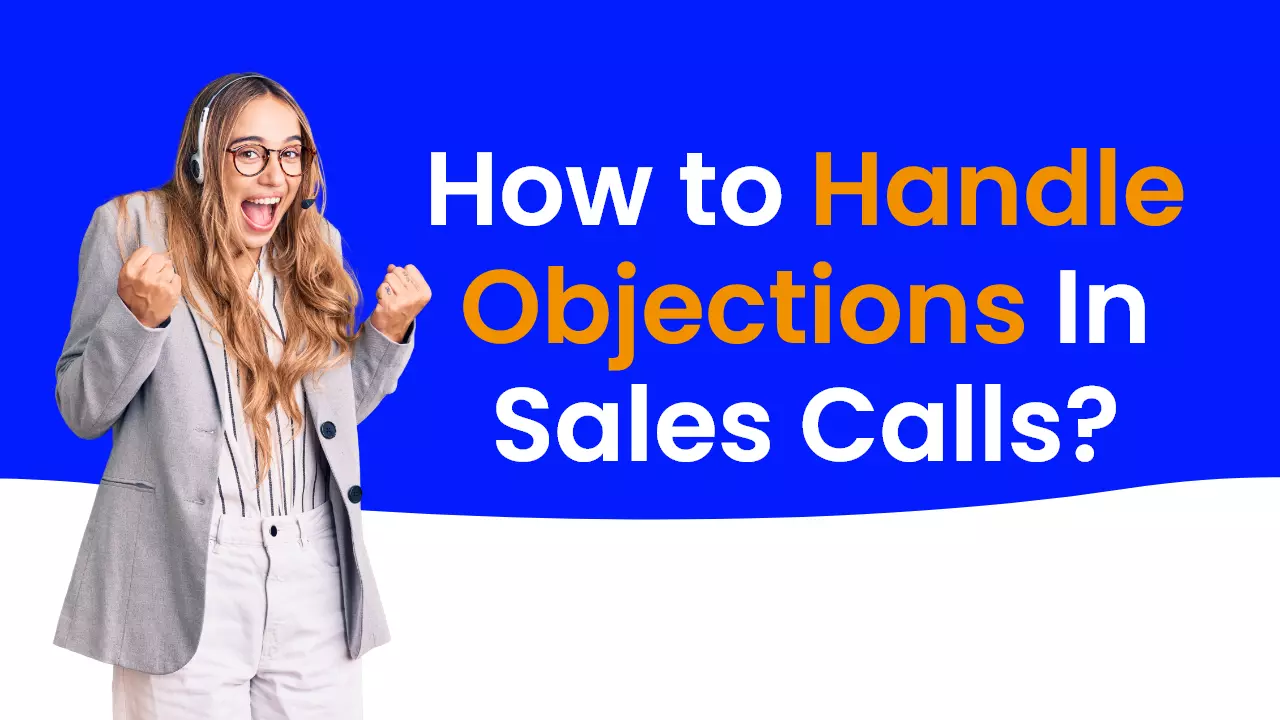If you have chosen sales as your profession, you must deal with sales objections when you virtually talk to your prospects. You may also hear many nos and why customers hesitate to buy your product.
However, you can not let them get you down. Instead, you have to find creative ways to overcome objections. Objection handling is an essential part of selling but can also be a roadblock when trying to move your potential customers through the pipeline.
You may be convinced to accept the breakup email straight away. But to become a successful salesperson, learning how to resolve these concerns is important.
In this article, we will describe everything you need to know about handling objections in sales and how to overcome these objections.
What Is Sales Objection?
A sales objection is any concern from a potential buyer about a barrier affecting their ability to buy from you. It shows that you need to address more aspects of the buying process than what you anticipated at the start.
Sales objections often arise when buyers lack the necessary resources, interest, need, or ability to purchase from you at a particular time. Although objections can be challenging and frustrating for salespeople, they do not always lead to dead ends.
You can overcome these objections with the right approach. You must need some strategies for dealing with these potential roadblocks. But first, you must understand what objection handling is.
What Is Objection Handling?
Objection handling is how a sales representative responds to prospects’ concerns and alleviates these concerns to move forward smoothly. Typically, these objections are about prices, competitors, or product fit. Sometimes, the objection may be a classic way of dismissing or avoiding the sale.
In other words, objection handling means responding to the buyer in a way to change their mind and remove their concerns. Some representatives argue with their customers to convince them to back down, but this argument is not true objection handling. In such cases, customers end up more convinced than ever of their position, and the salesperson destroys the trust and reputation they have developed.
Instead of telling your customers they are wrong, try to convince them politely of your point of view. If you find that you cannot persuade them, it may indicate that they are not a suitable fit for your product or service.
It is also crucial to differentiate between objections and brush-offs. Objections are authentic reasons, while brush-offs are just excuses.
- If you call a prospect to sell a product and he says, “I find your product valuable, but I am not sure about buying it for X reason”, it is an objection.
- While a brush-off is when you call a prospect, and he responds, “I don’t want to talk to you”.
It means that objections are way more serious than a brush-off.
What Are The Types Of Sales Objections?

The key factors that typically contribute to a successful sale are whether the prospect has the budget for the product or service, whether you have the authority to persuade them, whether they truly need the offering, and whether the timing suits them.
This concept is commonly known as BANT (Budget, Authority, Need, and Timing) and should be a standard part of your qualification process. It is important to know the types of sales objections to prepare the right strategies for objection handling.
Here are some most common types of sales objections:
1. Lack Of Budget
Objections like “It is too expensive” or other objections based on price are the most frequent objections a salesperson encounters. It is because almost all purchases come with some financial risks.
As a sales representative, you must find a great way to position your product or service and demonstrate its value. It means you should turn the conversation that describes risk vs reward.
By describing the value and showing how your solution will help them, they may be convinced that the reward is enough to justify the price.
2. Lack Of Trust
These objections are like “I have never heard about your company”, and it is because people always want to do business or make purchases from people they like, know and trust.
During an inbound sales conversation, it is probable that the prospect has engaged with your content or is somewhat familiar with your organization. If the prospect raises this objection, you can refresh their memory by highlighting your previous interactions. Alternatively, you could assess your sales cycle and determine if it is viable to nurture the prospect through it.
But all the conversations are not inbound, and some prospects never heard about your company. At this point, it is essential to reinforce the value you offer with your elevator pitch. Emphasise the expertise and credibility of your organisation in the market.
3. Lack of Urgency
Some people raise objections by saying that the product or service is not important to them right now. Here you have to figure out whether the timing is an issue or a prospect is trying to brush you off. One way to do it is by asking them to explain why it is unimportant or their current priorities.
Pay close attention to their response and distinguish between concrete timing issues and vague excuses. If they make elaborate justifications for inaction on a real pain point, it could be an opportunity to pursue further. If nothing else works, arrange a future appointment to explore the issue more deeply.
4. Lack Of Need
Some prospects have objections like “I don’t see how your product/service can help me.”
However, this type of objection allows you to give information about your product and get information from prospects in return.
Use open-ended questions to evaluate the needs of prospects. If you find a match, utilise it to showcase your value.
How To Handle Objections In Sales?
Handling objections is a natural but frustrating fact of sales life. So every salesperson needs to have a grip on certain skills and actions to carry out this process efficiently.
It may include social awareness, getting background information leading with empathy and asking open-ended questions.
i. Having Situational Awareness
No specific or magic formula fits handling all types of objections or concerns that prospects might bring up. To effectively address a prospect’s objections, it’s crucial to have a firm grasp on various factors, such as the stage of your sales process, the type of deal you are pursuing, and the prospect’s requirements and preferences.
This situational awareness is essential in comprehending the circumstances influencing the prospect’s objections. Therefore, it’s crucial to maintain awareness of the situation as your conversations with each prospect evolve.
ii. Getting Background Information
Acquiring in-depth knowledge can enhance your ability to obtain practical and useful situational awareness.. Therefore it is important to research your prospects themselves and their companies thoroughly.
Consider the challenges that the company is presently confronting. Examine the common problems faced by the prospect’s peers in the industry. If you have previously collaborated with organizations of similar size, try to recollect the objections they raised.
To better communicate with your contact, it is important to understand their role within the company. You should consider their decision-making authority, the specific aspects of the company’s operations that they are involved in daily, and the common challenges faced by someone in their position. By doing so, you can tailor your communication to better suit their needs and effectively engage with them.
If you want to get all this information, you must have tactics to put yourself in a solid position to handle objections.
iii. Leading With Empathy
As we already described, objections are a natural part of sales, and in many cases, they come with reasonable concerns. That is why you should not get frustrated or impatient with your prospects when they raise a concern.
Empathy is an integral part of every successful sales effort. You should not sell your product or service only for money. Instead, you should sell it because your product or service best suits their pain points. So you need to keep in mind their interests and needs.
If you stay on top of your prospect’s challenges and situations and deal with them with patience and empathy, you can anticipate the objections they raise. With this approach, you can build a stronger connection with your prospect and increase the likelihood of a successful outcome.
IV. Ask Open Ended Questions
Asking thoughtful, open-ended questions is a crucial skill that can enhance all the other points mentioned. To truly comprehend and address the objections raised by your prospect, it’s essential to identify the root cause of their pain points. Therefore, asking relevant questions can help you better understand their needs and concerns, allowing you to handle objections more effectively.
It often starts by asking tactful and relevant questions and allows prospects to discuss their response. Questions that elicit one-word, “yes or no” answers should be avoided. Silence should be employed to your benefit without hesitation to encourage your prospect to expound on their thoughts.
Allow your buyers to express their thoughts and concerns freely. By understanding their perspective, you can anticipate the objections they may raise and proactively address them. Take the time to empathise with their perspective and consider their potential objections to position yourself for a better outcome.
Switch To VoIP And Improve Your Sales
Switching to Voice over Internet Protocol (VoIP) can significantly improve sales processes by providing a more versatile and efficient communication infrastructure. VoIP allows sales teams to make and receive calls from anywhere with an internet connection, enabling remote work and flexibility. Features such as call recording and analytics help sales managers monitor and evaluate calls, providing valuable insights for coaching and training. VoIP also supports integration with Customer Relationship Management (CRM) systems, ensuring seamless access to customer information during calls, leading to more personalized interactions.
Moreover, the cost-effectiveness of VoIP reduces communication expenses, allowing businesses to allocate resources strategically and invest more in sales initiatives. The result is increased accessibility, better-informed sales strategies, and improved customer engagement, ultimately contributing to enhanced sales performance.
Conclusion - Objections In Sales Calls
In conclusion, objection handling is an integral part of the sales process. Every sales representative must be prepared to face objections and know how to handle them. By understanding the different types of objections, sales representatives can tailor their responses and approach to each potential customer.
It is essential to listen carefully to the customer’s concerns, respond to their objections politely and respectfully, and provide relevant information that addresses their concerns.
By doing so, sales representatives can turn objections into opportunities to build trust, demonstrate the value of their products or services, and close more deals. Objection handling requires patience, practice, and persistence, but it can be mastered with the right techniques and a positive attitude.




